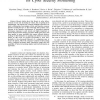Free Online Productivity Tools
i2Speak
i2Symbol
i2OCR
iTex2Img
iWeb2Print
iWeb2Shot
i2Type
iPdf2Split
iPdf2Merge
i2Bopomofo
i2Arabic
i2Style
i2Image
i2PDF
iLatex2Rtf
Sci2ools
HASE
2016
IEEE
2016
IEEE
Game Theory with Learning for Cyber Security Monitoring
Abstract—Recent attacks show that threats to cyber infrastructure are not only increasing in volume, but are getting more sophisticated. The attacks may comprise multiple actions that are hard to differentiate from benign activity, and therefore common detection techniques have to deal with high false positive rates. Because of the imperfect performance of automated detection techniques, responses to such attacks are highly dependent on human-driven decision-making processes. While game theory has been applied to many problems that require rational decisionmaking, we find limitation on applying such method on security games. In this work, we propose Q-Learning to react automatically to the adversarial behavior of a suspicious user to secure the system. This work compares variations of Q-Learning with a traditional stochastic game. Simulation results show the possibility of Naive Q-Learning, despite restricted information on opponents.
Related Content
| Added | 03 Apr 2016 |
| Updated | 03 Apr 2016 |
| Type | Journal |
| Year | 2016 |
| Where | HASE |
| Authors | Key-whan Chung, Charles A. Kamhoua, Kevin A. Kwiat, Zbigniew T. Kalbarczyk, Ravishankar K. Iyer |
Comments (0)

